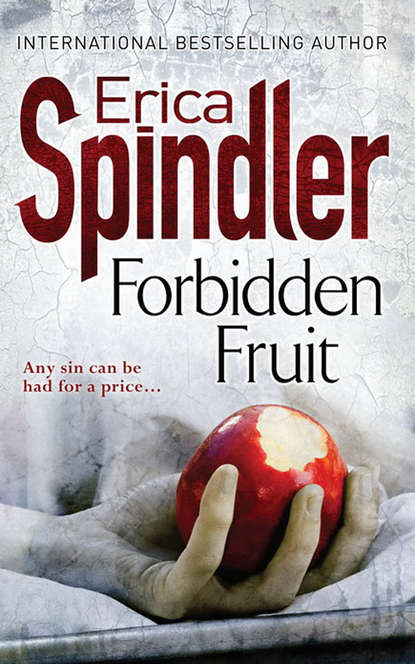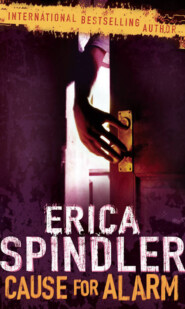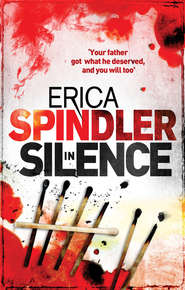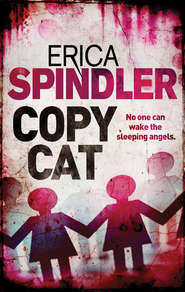По всем вопросам обращайтесь на: info@litportal.ru
(©) 2003-2024.
✖
Forbidden Fruit
Автор
Год написания книги
2018
Настройки чтения
Размер шрифта
Высота строк
Поля
Chapter 12
Hope knew of places in the French Quarter where she could get anything she needed, where she could fill any dark, uncontrollable desire that raged inside her. Many of these places were public and appeared to be nothing more than bars or shops or strip clubs. Most were frequented by wide-eyed tourists who never suspected what went on behind the public show.
Tonight, The Darkness had brought her to one of them.
Hope slipped through a rear door and headed down a narrow, dimly lit hallway. The walls were damp; the air fecund. From between the hundred-year-old plaster walls she could hear the scurry of cockroaches. A place as old as the French Quarter harbored many creatures. Some of them human.
She had disguised herself, not that anyone from her circle would see her here. But she knew not to take chances. She had visited this place, and others like it, many times before.
With each step, The Darkness grew stronger inside her, beating…beating…building to a fever pitch. Building until all that was left of Hope St. Germaine was a throbbing shell. Inside her burned an inferno that needed to be quenched before it consumed her live.
She would hate herself tomorrow. As always, she would curse her mother, her past, all the Pierron women. She would punish herself; she would do penance.
But at least The Darkness would be sated. At least, for a while, it would slumber inside her. And maybe, this time it would slumber forever.
And she would finally be free.
She stopped before the door marked by the number three. She drew in a shuddering breath, the blood thrumming in her head, the call so loud it reverberated through her like tribal drums. She reached for the knob and the metal felt cold against her fevered skin. She twisted and pushed; the door eased open.
On the bed, naked, the man waited for her.
Chapter 13
Glory did as she promised her mother. Her every waking moment she devoted to being the good girl her mother wanted her to be. She walked instead of ran, prayed instead of sang; she neither laughed too much nor too loudly; she never complained, talked back or expressed a wish that ran counter to her mother’s.
The days became weeks. Still, her mother did not ask Mrs. Cooper or Danny back. Still, Glory sometimes awakened in the night to find her mother looking at her in that way.
At first Glory didn’t understand. Then she realized what her mother was up to: she planned Mrs. Cooper’s return to be a birthday surprise. So Glory waited eagerly for her eighth birthday to arrive. She counted the days, then the hours. She continued to be the best girl she could be.
Her birthday finally arrived. That morning, she raced down to breakfast, eager to welcome Mrs. Cooper back, eager to see her soft smile and kind blue eyes. Eager to ask about Danny.
Instead, she was greeted by grim Mrs. Greta Hillcrest, the new housekeeper.
Disappointment, so bitter she tasted it, welled up inside her. Turning, Glory ran to her bedroom and locked herself inside.
She threw herself on the bed and cried, cried until she had no more tears. She had been so certain her mother planned to surprise her; she had worked so hard to earn that surprise.
Now she knew the truth.
Her mother would never rehire Mrs. Cooper. Because no matter how hard Glory tried, no matter how much she wanted it, she would never be a good enough girl for her mother. She would never be able to make her happy or proud, she would never be the daughter her mother longed for.
Glory hugged herself hard. She didn’t understand what she had done, she didn’t know why she always fell short. But she did fall short. And she always would.
Her mother had known that. All along, Glory realized, suddenly angry. Even as she had been making the deal, she had known Glory wouldn’t please her. She’d never had any intention of rehiring Mrs. Cooper.
Anger took Glory’s breath. Her mother had lied. She had tried to trick Glory. All along, she had known that her daughter would never be a good enough girl to please her.
The anger built inside Glory; it stole her tears, her hurt and disappointment. And it brought her, oddly, a measure of peace.
Much later, Glory gazed at her birthday cake, at the eight flickering candles. Around her, the last chorus of “Happy Birthday” ended and the assembled group burst into applause. For as long as she could remember, every birthday she had wished for the same thing—that her mother would love her.
Not this year, Glory decided defiantly, chest aching with her unshed tears. She would never again waste one of her wishes on her mother.
Taking a deep breath, Glory blew out her candles.
Part 4 Family
Chapter 14
New Orleans 1980
He’d had it. Santos dug his duffel bag off the top shelf of the bedroom closet. He had taken all the paid-for caring, all the phony concern he was going to. He was out of here.
And this time the state wouldn’t find him. This time they wouldn’t be able to drag him back; they wouldn’t be able to force him into another foster home.
In the year and a quarter since his mother’s murder, the state had provided him with four foster families. Each family had been a learning experience. The first had taught him not to think—even for a minute—of them as a real family, as his family. He was nothing more than a job for them, a crusade, an income-earning cause.
The second family had taught him not to cry—no matter what was said or done to him, no matter how much he hurt. They taught him that his pain was a private thing, something that mattered only to him. He learned quickly that when he exposed his true feelings, he opened himself to ridicule.
The third family had taught him to expect nothing from other people, not even basic human decency. He had learned nothing from this, his fourth family, because he had no spot left that was vulnerable to such a lesson. He had no hopes, no illusions, no small, secret wishes of love from them. He had closed himself off from his foster family and everyone else, as well.
Consequently, he had been labeled difficult and uncommunicative by the families who had taken him in and by the social workers, his teachers and the school administrators.
Santos fisted his fingers. In a little over a year, he had suffered through the aftermath of his mother’s murder, he had lived with four different families in four different areas of the city and had attended four different schools. He had lost all his old friends and made no new ones. His whole life had changed. And yet, he was branded as difficult and sullen. It was just as his buddies had always said, the system sucked.
This time they wouldn’t find him.
Santos emptied his drawers and stuffed his meager belongings into his duffel. They wouldn’t find him because now he understood where he had gone wrong, the mistake he had made each time he’d run away.
He hadn’t run far enough.
He had to leave New Orleans. If he stayed, they would find him, they would drag him back, put him in another home. He couldn’t bear another “new” family. He couldn’t bear another school, new surroundings, new faces. Not ones that were forced on him. He was sixteen now, practically a man. He could make it on his own.
He had planned his escape carefully. He had saved—a dollar here, a dollar there—fifty-two dollars. He had studied a Louisiana map and decided on Baton Rouge as his destination. It was big enough to disappear in, it was a university town with a lot of kids and was close to New Orleans. A mere ninety or so miles.
Santos hadn’t forgotten his vow to find his mother’s killer. As soon as he was old enough to be beyond the state’s grasp, he would return to New Orleans and make good on that vow.
His mother.
A catch in his chest, he fished a small jewelry box out of the back of his desk drawer, leaving behind the school supplies he would have no need for now. He opened the box and drew out the earrings, made of colored glass beads.
Carefully, almost reverently, Santos trailed the earrings across his palm. Inexpensive, more than a little gaudy, his mother had loved these earrings. “Austrian crystal,” he could hear her telling him the day she had bought them. He remembered her laughing as she clipped them on. They had almost brushed her shoulders, they were so long. She’d called them shoulder dusters. With his mind’s eye, he could see her wearing them, see how they caught the light when she moved, sparkling like colored diamonds.
The memory was at once sweet and painful, and he laid the earrings back onto their bed of cotton, then tucked the box with the rest of his things into his duffel. He began to zip the bag, then thinking better of it, retrieved the box and slipped it into one of the front pockets of his jeans. The earrings would be safer there.
His mother had had nothing of monetary value, but these earrings meant more to him than a thousand real diamonds. He couldn’t bear to lose them.
He finished zipping his bag, then took one last glance around the room that had never felt like his. He had no regrets, he thought. Not about leaving this family without a goodbye, not about sneaking out in the middle of the night or about the twenty dollars he had borrowed from the coffee can in the pantry. This family would not be sorry he had gone, and as for the money, he would return it when he could.











